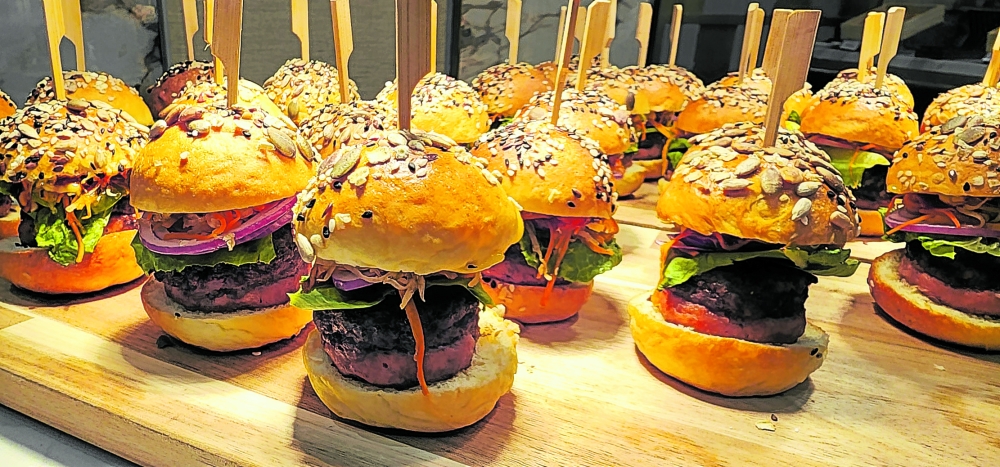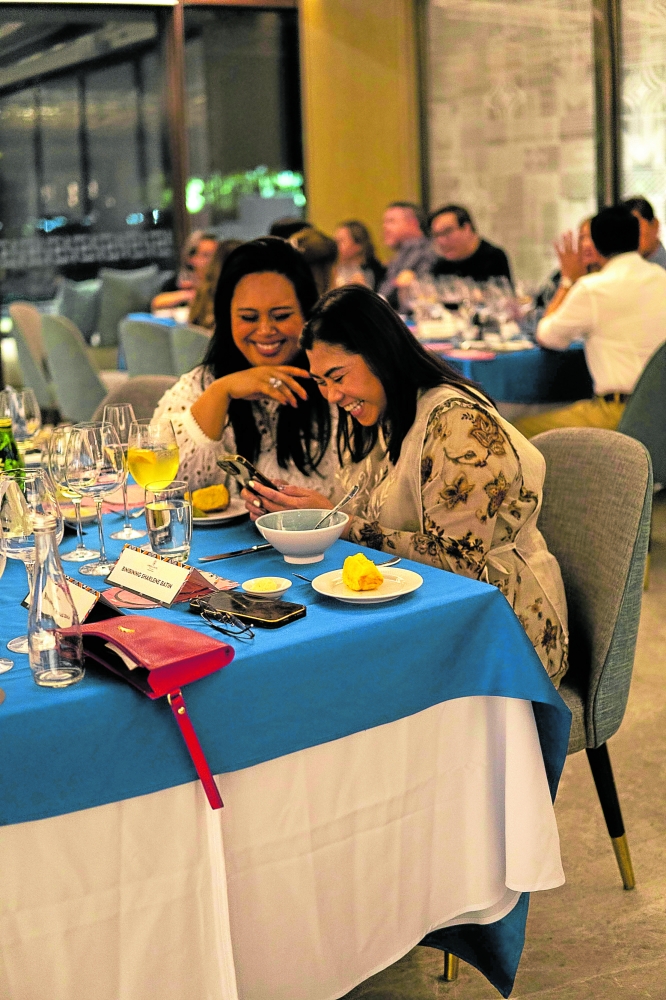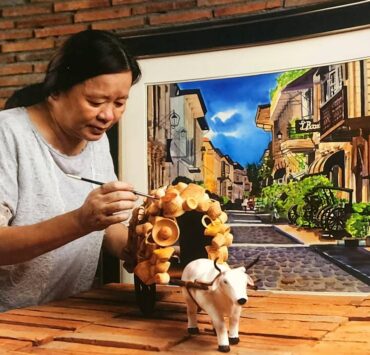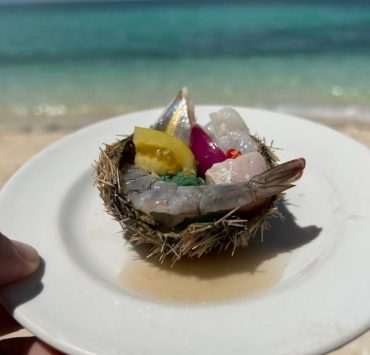‘My father and I connected through his broken English—and his food’
I am Filipino—an inheritor of a glorious past …”
Chef Nicole Ponseca effortlessly recited the opening paragraph of Carlos P. Romulo’s 1941 essay to explain that it served as the inspiration for the title of her 2019 James Beard finalist cookbook, “I Am Filipino: And This Is How We Cook.”
Ponseca was in Manila for the recent “Manila Gastronomiya” event as a guest speaker, where she discussed the rise of Filipino cuisine in the United States and the role of her New York restaurants, Maharlika and Jeepney, in that phenomenon. Ponseca was a captivating storyteller, weaving data with anecdotes, making her talk both informative and engaging.

During our interview at the Grand Westside Hotel, she moved from her chair to sit on the ground. “It’s just more comfortable this way,” she explained, prompting this writer to follow suit. Our conversation, peppered with laughter and tears, stretched to nearly an hour.
We parted ways, only to run into each other again at the restaurant downstairs—the same place where we had lunch earlier. Her famous chori burger from Jeepney was served as sliders for lunch.
From the menu, Ponseca ordered pinakbet, her favorite. She also got tinola, which she portioned, making sure to fill all our small bowls. In hindsight, her food choices and the sharing gesture showed how much she is her father’s daughter.

Childhood memory
She recounted a childhood memory: She was in grade school when her father picked her and three girlfriends up after cheerleading practice. She begged her dad to buy them a Happy Meal. Her dad parked the car as she and her friends went inside the fast-food chain.
“I came back eating my french fries and Happy Meal, and I was so happy. But I could feel my father’s sadness. It was almost like he had a tear in his eye,” she said.
She knew something was wrong but didn’t want to say anything in front of her friends. Her father remained quiet and distant during the entire ride home.
“He said, ‘I just don’t want you to forget you’re Filipino.’ And I said, ‘Why?’ And he replied, ‘You didn’t ask me if I wanted anything. You didn’t ask me if I was hungry,’” she recalled.
In Filipino culture, it’s considered good manners to invite others to join you when you’re eating. Moments like these with her father shaped her understanding of Filipino identity while growing up in the US.
Her dad was a cook in the Navy, while her mother worked as a nurse. Both emigrated from the Philippines.
“They would play mahjong and eat while I was running around at 5 years old. He would subo me (feed me by hand) with the food they were eating. He was often told not to give me bagoong with my kare-kare, but my dad said, ‘No, she will like it. She is Pinoy,’” she said.
And indeed, she did like bagoong, even as a child.
“My father’s English wasn’t very good. He wasn’t well-educated, whereas my mother was very articulate. So, the only way my father and I could connect was through his broken English and his food. I am Filipino through food,” she said.
From advertising to the kitchen
After school, Ponseca landed a job at the advertising agency Saatchi and Saatchi, and eventually rose to the position of vice president. But she knew that she always wanted to elevate Filipino cuisine in the US. She noted that, at the time, there were only a few Filipino establishments there, like Max’s, Goldilocks, Amy Besa and Romy Dorotan’s Cendrillon, and various turo-turo (cafeteria-style restaurants).
Ponseca worked as a dishwasher at night and an advertising executive by day. Anything to learn the ropes. She had no money and no connections in the restaurant world. All she had was her drive to give Filipino Americans a stronger identity and sense of heritage.
In 2008, Ponseca was ready to make her move with her $10,000 capital.
She negotiated with a French restaurant to use their space on weekends and opened the pop-up restaurant Maharlika in 2011—before she even knew what the word “pop-up” meant.
While running Maharlika, she found another Filipino restaurant on the verge of closing, operated by an elderly couple. She proposed a merger, and Jeepney Restaurant was born in 2012.
“Maharlika was more feminine, based on brunches and heritage dishes. Jeepney was rugged, Americana, sexy and rock-’n’-roll,” she said. “But it bombed. I couldn’t pay rent for five months.”
Ponseca went back to the drawing board, remembering what had motivated her in the first place: Why call dinuguan “chocolate meat” instead of “blood stew”? Why treat balut as a “Fear Factor” challenge that must be overcome? She used to be embarrassed by these dishes and the fact that her father ate with his hands.
“My American friends would come over and make fun of my father, which made me so sad because I love my dad. So, I decided to turn it around,” she said.
Embracing Filipino-ness
At Jeepney, the staff would shout “balut!” whenever someone ordered it, and they let diners enjoy kamayan (eating with bare hands), just like her father did.
These small acts made a difference. When there was little progress in popularizing Filipino food from 1998 to 2008, the tide changed just two years after she established Maharlika and Jeepney.
“I was with [chef and TV personality] Andrew Zimmern when he said that Filipino food would be the next big thing, and it became the headline for foodies,” she said. “I was the first Filipino James Beard finalist. Last year, we had a record number of Filipino James Beard finalists.”
Knowing her audience helped her a lot. She didn’t wait for validation from other races to tell her that what she had was good. Embracing the inherent deliciousness of the Filipino dishes was enough to propel her forward.
“Our success wasn’t luck. It was meticulous and it was a thorough strategy,” she said. Another challenge she had to hurdle was sexism. It was a reality she experienced even in her own restaurant.
Maharlika closed in 2019; Jeepney closed in 2021. The latter’s closing was unexpected, because Jeepney was logging in the highest number of diners in the first quarter of 2020. However, the pandemic lockdown took its toll. Ponseca said they could have survived if they had chosen to keep fighting.
“But at this age, I had the foresight to ask: For what? I took a leap of faith, believing that closing it might open me up to more opportunities,” she said.
This is her mission now: to find collaborative partners to help her build something new. It doesn’t have to be in New York.
A bigger blow also came: Her father died from COVID-19.
“I think that was one of the reasons for closing Jeepney. I was an only child, so my connection to being Filipino—everything I do—is in service to him. I owe so much to him,” she said. The break from the demanding hours in the restaurant has allowed her to spend more time with her mother.
She answers “thank you” to those who tell her that they miss Jeepney. Ponseca misses serving people, the discipline of running a restaurant, and the routine that comes with it. She misses the instant gratification of seeing people celebrate milestones in a place she built. But there are no regrets, and there’s no looking back.
The trailblazing Ponseca is poised to conquer uncharted territory once again.

















